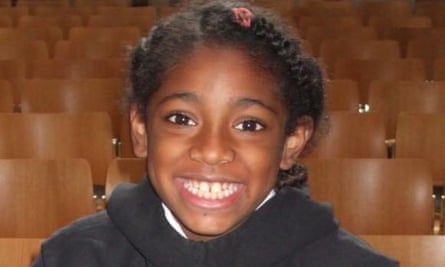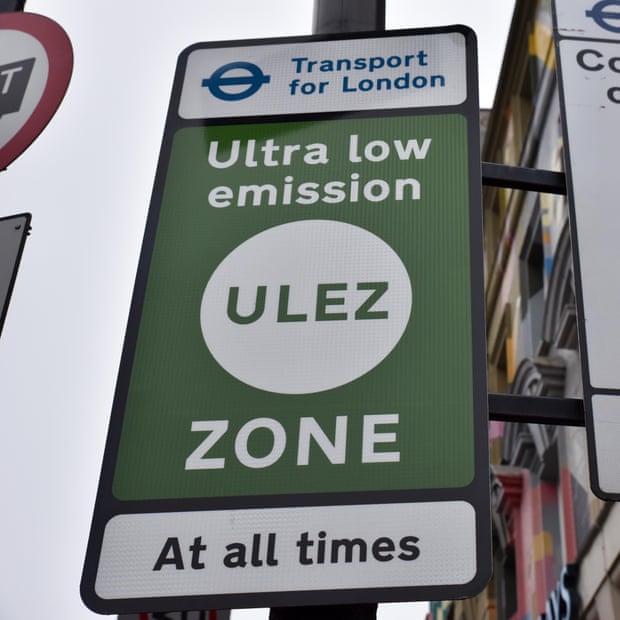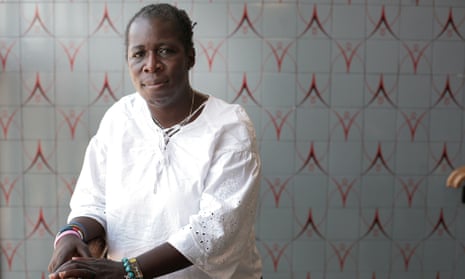The mother of a schoolgirl who died of an asthma attack linked to air pollution has warned time is running out to save other children from a similar plight and called on politicians to do more to tackle the crisis.
On the day mayor of London, Sadiq Khan, launched the city’s new ultra-low emissions zone (Ulez) to improve deadly air pollution, Rosamund Kissi-Debrah urged others to follow his example and called on him to go even further, faster.
“It is a really brave thing that Sadiq Khan is doing and I know he really cares about the damage that air pollution is doing to our children’s health, but it is not enough,” said Kissi-Debrah.
“I just wish he could be even braver and go further, quicker, because I do worry we are running out of time to tackle this.”
Kissi-Debrah’s nine-year-old daughter, Ella, died six years ago and medical experts have linked her death to spikes in air pollution from traffic near her home in south London. Earlier this year the attorney general, Geoffrey Cox, granted Kissi-Debrah the right to go to the high court for a new inquest in her effort to get air pollution formally recognised as the cause of Ella’s death.
Toxic air leads to the premature deaths of at least 40,000 people a year in the UK – 9,000 in London – and results in hundreds of thousands more suffering serious long-term health problems.

Khan’s “world leading” Ulez scheme will impose a £12.50 charge to drive into central London, 24 hours a day, for all but the cleanest cars and vans. The zone is expected to reduce road transport emissions by about 45% and the scheme will be expanded to the north and south circular from October 2021.
The move has been widely welcomed by parents’ groups, doctors and environmental campaigners who say it will help to kickstart a cleanup of the capital’s toxic air. But many have urged politicians across the country to go even further.
Quick GuideWhat is the Ulez?
Show

When and where does it operate?
From 8 April 2019, in central London’s congestion charge zone, 24 hours a day, seven days a week. From October 2021 the Ulez will be expanded to inner London boroughs, up to the North and South Circular roads.
Who pays?
Drivers of older cars, vans and motorbikes will have to pay £12.50 a day if they do not meet tighter exhaust emissions standards. Non-compliant lorries and coaches will be charged £100 a day.
Is my car compliant?
If it is a Euro 6 diesel (normally made after 2015) or Euro 4 petrol engine (newer than 2005) it is exempt from the charge. Drivers can check whether their vehicle is compliant on the TfL website.
Is this instead of the congestion charge?
No, it is as well as the C-charge, which applies to those who enter the zone from Monday and Friday between 7am to 6pm. That costs £11.50.
How will drivers know and what if I don’t pay?
Number-plate recognition cameras will check the cars, whose emission certifications are in the DVLA database. Drivers can pay the charge by midnight the following day. Failure to pay will result in a fine of £160 for cars or £1,000 for lorries.
Will any drivers of older vehicles be exempt?
Disabled badge holders, until 2025, and residents of the current congestion charge zone, until 2021, will be exempt. So will black-cab drivers.
A group of 30 headteachers in London wrote to Khan welcoming the scheme but called for more support for action to tackle the effect of air pollution on children.
“Protecting our pupils’ welfare is not just one of our key duties but should also be an overriding priority for wider society,” they said in a letter organised by Greenpeace. “We want our pupils to develop healthy brains, not unhealthy lungs.”
Prof Jonathan Grigg of the Royal College of Paediatrics and Child Health and an expert on air pollution said: “Approximately 50% of air pollution comes from road transport and 40% comes from diesel, so the introduction of London’s Ulez is extremely welcome.
“Coupled with this move, we need to see employers and schools encouraging better use of public transport and active travel options like walking and cycling.”
Khan says Ulez is part of a wider package of measures that will drastically reduce air pollution over the coming years. New statistics show the scheme has already stimulated a drop-off in the number of dirty vehicles driving into central London with a 43% reduction of “non-compliant” cars and vans between February 2017 and March this year.
But with more evidence emerging almost weekly about the effect of air pollution on conditions from lung development to heart problems, to strokes and cognitive ability, Kissi-Debrah says time is running out.
“I was at a bus stop yesterday and as the bus pulled away there was a group of children standing chatting and laughing as the exhaust fumes went all over them,” she said.
“It was so harrowing after what happened to Ella. I know what it is doing to them and their bodies and they probably have no idea – that is why I keep on going, keep on telling people the facts about this.”
She called on people to think “really hard” about whether they needed to own or use a car or get in a taxi or Uber, adding that Ulez needed to be “London wide” and not stop in central London or even at the north and south circular, calling on politicians – nationally and regionally – to face the scale of the crisis head-on.
“We don’t have time to wait. I really fear that if we get another hot summer, with the levels of pollution we have now, we are going to see more children die just like my daughter did and I can’t bear that thought.”
